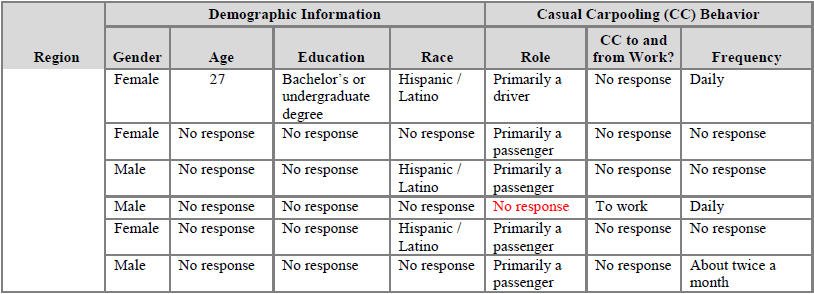U.S. Department of Transportation
Federal Highway Administration
1200 New Jersey Avenue, SE
Washington, DC 20590
202-366-4000
Federal Highway Administration Research and Technology
Coordinating, Developing, and Delivering Highway Transportation Innovations
| ERRATA REPORT |
| This report is an archived publication and may contain dated technical, contact, and link information |
| Publication Number: FHWA-HRT-13-053 Date: May 2013 |
Publication Number: FHWA-HRT-13-053 Date: May 2013 |
Editorial corrections were made to this report after the report was originally published. The following table shows the modifications that were made to this report.
| Location | Correction |
| Page i, Box 15 | Add:"Department of the Navy Technical Contact: Marc Oliphant" |
| Page 1 | Change: Casual Carpooling Scan Report and Appendix B to the Casual Carpooling Scan Report to: Casual Carpooling Scan Report and Appendix B to the Casual Carpooling Scan Report |
| Page 5 | Change sentence to: "As shown in figure 1, casual carpooling occurs in the…” |
| Page 15, Table 3 | Add: “No Response” to blank cell. |
Technical Report Documentation Page
15. Supplementary Notes FHWA’s Contracting Officer's Technical Representative (COTR): Zachary Ellis, HRTM-30 |
This report documents a qualitative research study sponsored by the Federal Highway Administration (FHWA) Exploratory Advanced Research (EAR) Program that was conducted from June 2012 through September 2012 to explore the phenomenon of casual carpooling. FHWA’s EAR Program addresses the need to conduct longer term and higher risk breakthrough research with the potential for transformational improvement to plan; build; renew; and operate safe, congestion-free, and environmentally sound transportation systems. This study is one component of a two-part study that explored the mechanics, logistics, and success of the practice. During November and December 2010, the EAR Program supported a team that consisted of transportation professionals, academic faculty, and business entrepreneurs who visited casual carpooling lines in Washington, DC; Houston, TX; and San Francisco, CA, to observe and compare practices among the three locations. The Casual Carpooling Scan Report is documented in a separate report, and Appendix B to the Casual Carpooling Scan Report is also available separately.(1,2)
In the Washington, DC, area, casual carpooling is commonly referred to as “slugging.” As shown in figure 1, casual carpooling occurs in the Washington, DC, area primarily along Interstate (I) 95 and I-395 between Washington and Northern Virginia, extending as far south as the north side of Fredericksburg, VA. A few “slug lines” also operate along I-66 heading westbound out of Washington to Manassas, VA. Casual carpooling in this region is equally active during the morning (starting as early as 5:30 a.m. and lasting until 8:45 a.m.) and afternoon (starting as early as 3 p.m. and continuing until 6 p.m.) commutes.
Table 3. Participant summary (San Francisco, CA, region).
